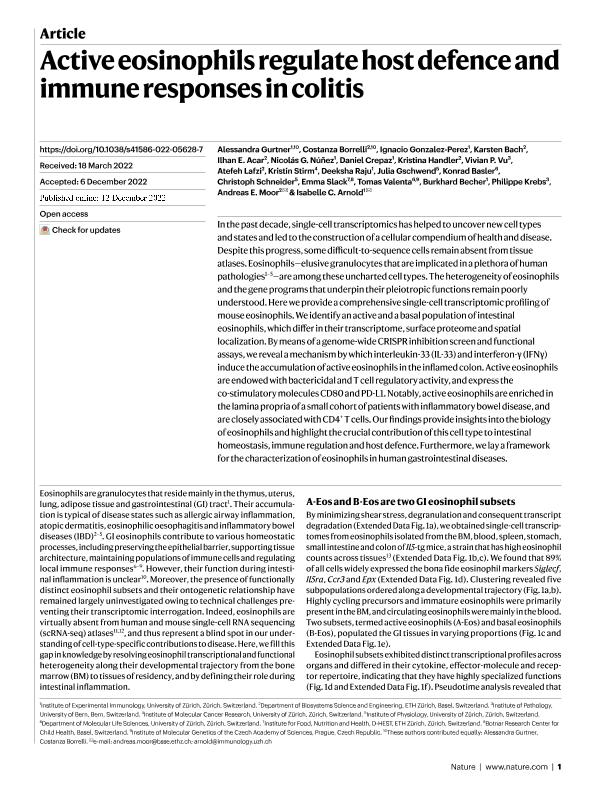Mostrar el registro sencillo del ítem
dc.contributor.author
Gurtner, Alessandra
dc.contributor.author
Borrelli, Costanza
dc.contributor.author
Gonzalez Perez, Ignacio
dc.contributor.author
Bach, Karsten
dc.contributor.author
Acar, Ilhan E.
dc.contributor.author
Núñez, Nicolás

dc.contributor.author
Crepaz, Daniel
dc.contributor.author
Handler, Kristina
dc.contributor.author
Vu, Vivian P.
dc.contributor.author
Lafzi, Atefeh
dc.contributor.author
Stirm, Kristin
dc.contributor.author
Raju, Deeksha
dc.contributor.author
Gschwend, Julia
dc.contributor.author
Basler, Konrad
dc.contributor.author
Schneider, Christoph
dc.contributor.author
Slack, Emma
dc.contributor.author
Valenta, Tomas
dc.contributor.author
Becher, Burkhard
dc.contributor.author
Krebs, Philippe
dc.contributor.author
Moor, Andreas E.
dc.contributor.author
Arnold, Isabelle C.
dc.date.available
2023-09-19T17:20:32Z
dc.date.issued
2023-03
dc.identifier.citation
Gurtner, Alessandra; Borrelli, Costanza; Gonzalez Perez, Ignacio; Bach, Karsten; Acar, Ilhan E.; et al.; Active eosinophils regulate host defence and immune responses in colitis; Nature Publishing Group; Nature; 615; 7950; 3-2023; 151-157
dc.identifier.issn
0028-0836
dc.identifier.uri
http://hdl.handle.net/11336/212112
dc.description.abstract
In the past decade, single-cell transcriptomics has helped to uncover new cell types and states and led to the construction of a cellular compendium of health and disease. Despite this progress, some difficult-to-sequence cells remain absent from tissue atlases. Eosinophils—elusive granulocytes that are implicated in a plethora of human pathologies1–5—are among these uncharted cell types. The heterogeneity of eosinophils and the gene programs that underpin their pleiotropic functions remain poorly understood. Here we provide a comprehensive single-cell transcriptomic profiling of mouse eosinophils. We identify an active and a basal population of intestinal eosinophils, which differ in their transcriptome, surface proteome and spatial localization. By means of a genome-wide CRISPR inhibition screen and functional assays, we reveal a mechanism by which interleukin-33 (IL-33) and interferon-γ (IFNγ) induce the accumulation of active eosinophils in the inflamed colon. Active eosinophils are endowed with bactericidal and T cell regulatory activity, and express the co-stimulatory molecules CD80 and PD-L1. Notably, active eosinophils are enriched in the lamina propria of a small cohort of patients with inflammatory bowel disease, and are closely associated with CD4+ T cells. Our findings provide insights into the biology of eosinophils and highlight the crucial contribution of this cell type to intestinal homeostasis, immune regulation and host defence. Furthermore, we lay a framework for the characterization of eosinophils in human gastrointestinal diseases.
dc.format
application/pdf
dc.language.iso
eng
dc.publisher
Nature Publishing Group

dc.rights
info:eu-repo/semantics/openAccess
dc.rights.uri
https://creativecommons.org/licenses/by-nc-sa/2.5/ar/
dc.subject
Cancer
dc.subject
Eosinófilos
dc.subject.classification
Inmunología

dc.subject.classification
Medicina Básica

dc.subject.classification
CIENCIAS MÉDICAS Y DE LA SALUD

dc.title
Active eosinophils regulate host defence and immune responses in colitis
dc.type
info:eu-repo/semantics/article
dc.type
info:ar-repo/semantics/artículo
dc.type
info:eu-repo/semantics/publishedVersion
dc.date.updated
2023-07-07T21:34:28Z
dc.identifier.eissn
1476-4687
dc.journal.volume
615
dc.journal.number
7950
dc.journal.pagination
151-157
dc.journal.pais
Reino Unido

dc.journal.ciudad
Londres
dc.description.fil
Fil: Gurtner, Alessandra. Universitat Zurich; Suiza
dc.description.fil
Fil: Borrelli, Costanza. ETH Zürich. Department of Biosystems Science and Engineering; Suiza
dc.description.fil
Fil: Gonzalez Perez, Ignacio. Universitat Zurich; Suiza
dc.description.fil
Fil: Bach, Karsten. ETH Zürich. Department of Biosystems Science and Engineering; Suiza
dc.description.fil
Fil: Acar, Ilhan E.. ETH Zürich. Department of Biosystems Science and Engineering; Suiza
dc.description.fil
Fil: Núñez, Nicolás. Universitat Zurich; Suiza. Consejo Nacional de Investigaciones Científicas y Técnicas. Centro Científico Tecnológico Córdoba. Centro de Investigaciones en Bioquímica Clínica e Inmunología; Argentina
dc.description.fil
Fil: Crepaz, Daniel. Universitat Zurich; Suiza
dc.description.fil
Fil: Handler, Kristina. ETH Zürich. Department of Biosystems Science and Engineering; Suiza
dc.description.fil
Fil: Vu, Vivian P.. University of Bern; Suiza
dc.description.fil
Fil: Lafzi, Atefeh. ETH Zürich. Department of Biosystems Science and Engineering; Suiza
dc.description.fil
Fil: Stirm, Kristin. Universitat Zurich; Suiza
dc.description.fil
Fil: Raju, Deeksha. Universitat Zurich; Suiza
dc.description.fil
Fil: Gschwend, Julia. Universitat Zurich; Suiza
dc.description.fil
Fil: Basler, Konrad. Universitat Zurich; Suiza
dc.description.fil
Fil: Schneider, Christoph. Universitat Zurich; Suiza
dc.description.fil
Fil: Slack, Emma. Botnar Research Centre For Child Health; Suiza. ETH Zürich. Department of Biosystems Science and Engineering; Suiza
dc.description.fil
Fil: Valenta, Tomas. Institute of molecular genetics of the Academy Of Sciences Of The Czech Republic; República Checa. Universitat Zurich; Suiza
dc.description.fil
Fil: Becher, Burkhard. Universitat Zurich; Suiza
dc.description.fil
Fil: Krebs, Philippe. University of Bern; Suiza
dc.description.fil
Fil: Moor, Andreas E.. ETH Zürich. Department of Biosystems Science and Engineering; Suiza
dc.description.fil
Fil: Arnold, Isabelle C.. Universitat Zurich; Suiza
dc.journal.title
Nature

dc.relation.alternativeid
info:eu-repo/semantics/altIdentifier/doi/http://dx.doi.org/10.1038/s41586-022-05628-7
Archivos asociados
